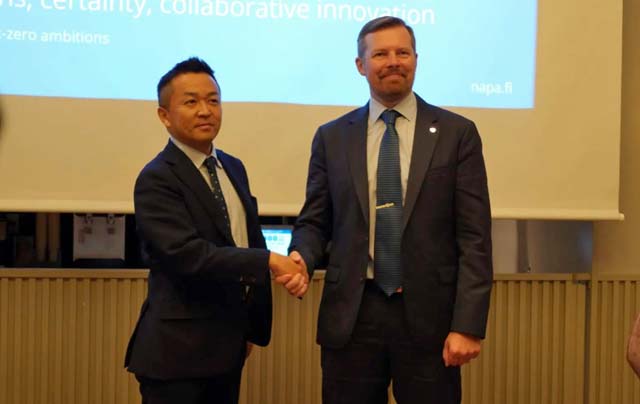CEO of maritime data and software company Napa, Mikko Kuosa, speaking in Japan, said that MEPC80’s adoption of more ambitious targets sends a global signal: action for emissions reduction is urgent and must begin now.
Being a major international shipping hub and a maritime-dependent economy, prominent in shipbuilding and vessel operations innovations, Japan has a critical role in the coming decades to ensure the decarbonisation of global fleets.
Kuosa said: “To achieve these IMO targets, the Japanese shipping industry and the global maritime need to take immediate action. However, there are roadblocks that are currently hindering the pace of action and innovation.”
These odstacles begin with the wait for future fuels, causing inertia, as the fuels will not be available at any meaningful scale for at least another decade. Napa considers that progress can only be achieved with energy efficiency technologies, such as wind-assisted propulsion, alongside operational measures, such as voyage optimization and weather routing solutions.
Kuosa continued: “Decarbonisation technology already exists but is often developed and used in silos. No single technology or company can solve the whole problem. So, collaboration is needed – but a trusted and transparent framework to make collaborations work is often lacking.”
Kuosa sees Napa has an important role in supporting Japan’s maritime industry, offering three action pillars which can help in contributing towards the maritime industry’s sustainability transition:
Fuel efficiency and carbon reduction with digital tools: 80% of shipping’s decarbonisation progress will come from efficiency measures, predicts McKinsey. Napa is spearheading this with ship weather routing and vessel performance optimisation solutions.
Decision confidence with data and simulations: Ship owners and operators need greater certainty on what technologies and fuel choices will be right for their fleets. Napa can help model, predict, and validate the impact of different decarbonisation measures using ship digital twins.
Framework for collaboration: Companies want to collaborate but hesitate due to the lack of trusted frameworks. Napa bridges this gap by offering transparent data-sharing systems that provide an understanding of the commercial and technological implications, helping all stakeholders – from very early the ship design phase to the complete operations and lifecycle – to collaborate with confidence.
Kuosa concluded: “The industry’s zero-carbon path is as multifaceted as it is complex. But there is a lot that we can do collaboratively to take control of our own emissions and draw our own pathways towards net-zero in a way that makes sense for our fleets and businesses. Across shipping, pioneers have already started the transition, and their experience shows that the sooner companies start planning the journey, the better off they will be.”



